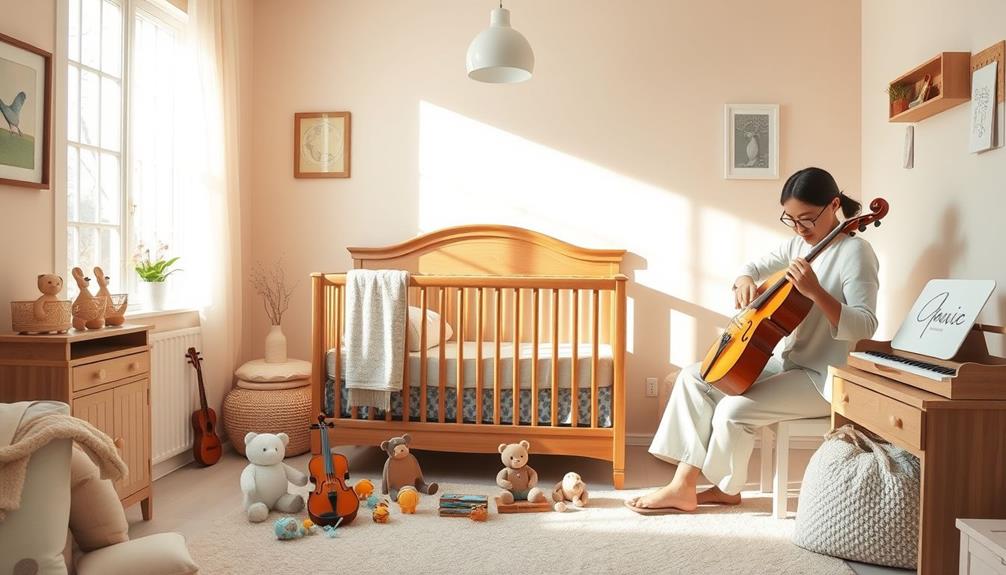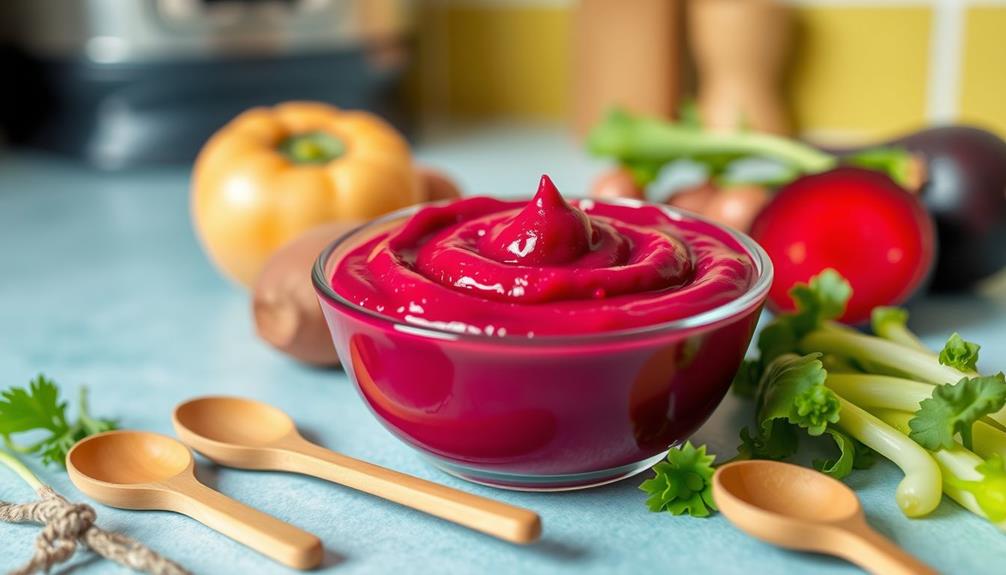To introduce your baby to classical music the Baby Einstein way, start by playing engaging selections like Tchaikovsky's Nutcracker or the Fantasia soundtrack during daily activities. Incorporate soft tunes as background music to create a comforting atmosphere. Consider attending family-oriented concerts to help your little one connect with the energy of live music. Encourage movement by dancing or using scarves to express emotions while listening. This exposure promotes cognitive development, creativity, and emotional understanding. As you explore these methods, you'll discover even more strategies to enrich your baby's musical journey and deepen their appreciation for classical sounds.
Key Takeaways
- Play classical music regularly at home to create a comforting atmosphere and enhance cognitive growth for your baby.
- Attend family-oriented concerts to provide interactive experiences and foster an appreciation for live music.
- Engage in movement activities like dancing or using scarves to connect physical movement with classical music enjoyment.
- Create a dedicated space for musical exploration with various instruments to encourage curiosity and independent discovery.
- Curate a diverse musical library and regularly update playlists to maintain interest and facilitate discussions about music preferences.
Recommended Classical Music Selections
Introducing your baby to classical music can be a delightful experience, and there are several recommended selections that cater specifically to young listeners. The Baby Einstein series, especially Baby Beethoven, provides an engaging introduction to classical music, making it perfect for little ears.
Additionally, exploring AI-generated music influences can offer insights into how technology shapes music appreciation from an early age. Tchaikovsky's Nutcracker is another fantastic choice, with its enchanting melodies that can easily capture your baby's attention.
You might also want to explore Camille Saint-Saëns' Carnival of the Animals. Its playful movements represent various animals, making it relatable and entertaining for children, which can spark their imagination.
Moreover, the Fantasia soundtrack offers a diverse mix of classical pieces combined with beautiful animation, helping your baby visually connect with the music.
Additionally, pieces like Handel's Water Music and Music for the Royal Fireworks are popular choices that introduce children to orchestral sounds and rich musical themes.
These recommended classical music selections provide a solid foundation for introducing classical music to your little one. By exposing your baby to these delightful pieces, you're setting the stage for a lifelong appreciation of music.
Engaging Methods for Exposure

To truly engage your baby with classical music, start by playing it regularly at home to create a comforting atmosphere.
Regular exposure to music can enhance cognitive growth and problem-solving skills, making it a wonderful addition to your baby's daily routine.
Consider attending live performances designed for families, where your little one can experience the magic of an orchestra firsthand.
Adding interactive movement activities can make music come alive, helping your baby connect with the sounds in a fun and physical way.
promotes physical health and reduces obesity rates
Play Music at Home
Playing classical music at home sets the stage for a rich auditory experience that can profoundly benefit your baby. Regular exposure to orchestral music creates a familiar environment, enhancing comfort and interest in musical sounds.
Incorporating music into your daily routines can uplift moods and foster a positive atmosphere for both you and your little one.
Here are three engaging methods to play music at home:
- Background Music: Play classical pieces softly during daily activities like feeding or bath time. This helps your baby associate music with comfort and relaxation.
- Interactive Movement: Encourage your baby to move or dance to classical tracks. This not only promotes physical engagement but also aids in developing motor skills and coordination.
- Creative Arts: Set up art activities where your baby can draw or color while listening to orchestral music. This multisensory approach enhances creativity and encourages self-expression.
Attend Live Performances
Attending live performances offers a unique chance for your baby to experience classical music in an engaging and exciting setting. Family-oriented concerts, like BBC's Relaxed Proms, create an interactive atmosphere where your little one can feel the energy of the music and witness audience participation.
These performances allow children to see musicians in action, helping them understand and appreciate the instruments being played. Many venues, such as Wigmore Hall, cater specifically to families, providing changing facilities and relaxed environments that make enjoying live music easier.
Bringing your baby to these performances fosters a sense of community, reinforcing the joy of music in a social setting. Plus, the experience of listening to classical music in a live orchestral context can spark an early interest in the art form.
As your child participates in these live concerts, they'll create lasting memories, cultivating a potential lifelong appreciation for classical music.
Interactive Movement Activities
Engaging your baby through interactive movement activities can transform the experience of listening to classical music into a dynamic adventure.
By incorporating dance and movement, you help your little one connect physically with the music, enhancing motor skills while exploring music theory in a playful way.
Here are three engaging methods to try:
- Dance to Classical Pieces: Play Tchaikovsky's Nutcracker and encourage your baby to dance along. This physical engagement allows them to express emotions tied to the music.
- Use Scarves or Ribbons: During listening sessions, provide scarves or ribbons for your baby to twirl and wave. This visual element not only enhances the experience but also promotes creative movement as they respond to the music.
- Interactive Listening Games: Inspired by Saint-Saëns' "Carnival of the Animals," create games where your baby mimics animal movements. This encourages imaginative play while introducing classical themes.
Developmental Advantages of Music

Introducing your baby to classical music can offer numerous developmental advantages that support their growth in various areas. One major benefit is enhanced cognitive development. Exposure to classical music can foster skills like memory retention and spatial reasoning, which are vital as your little one learns and explores their world.
Additionally, engaging with music production basics can inspire creativity and curiosity in young minds, providing an early appreciation for sound and rhythm, which can be further explored through important tools for creating engaging music tracks.
Research shows that early musical engagement also aids in language development, improving auditory processing and vocabulary skills. When babies hear melodies, they pick up the rhythms and patterns of speech, which lays the groundwork for effective communication.
Moreover, listening to music encourages emotional expression and regulation. As your baby experiences different sounds, they learn to understand and communicate their feelings more effectively. This emotional connection helps them navigate complex emotions as they grow.
Engaging with classical music promotes creativity and imagination, allowing your child to visualize stories and concepts through sound.
Additionally, regular interaction with music, including movement and dance, supports motor skills development and coordination, vital for their physical growth. By introducing your baby to classical music, you're providing them with a rich foundation for a well-rounded development.
Creating a Musical Environment

Creating a musical environment for your baby not only makes classical music a joyful part of their daily life, but it also nurtures their development in meaningful ways. By regularly playing classical music at home, you normalize its presence, creating a familiar atmosphere that encourages engagement.
Incorporating background music into daily routines can enhance mood and relaxation, making it a comforting constant in your child's environment. Additionally, studies suggest that exposure to music can positively impact cognitive development and emotional well-being, making it a beneficial choice for your child's growth.
Engaging with healthy lifestyle blogs can also provide tips for incorporating music into a balanced routine.
Here are three effective ways to foster this musical environment:
- Play Classical Music Regularly: Set aside time each day to play classical music, allowing your baby to absorb its rhythms and melodies.
- Create a Dedicated Space for Instruments: Establish a playful area filled with instruments where your child can explore and experiment, fostering curiosity and creativity.
- Engage with Visual Media: Introduce enchanting films like Fantasia to stimulate your child's imagination, pairing visuals with classical pieces for a richer experience.
Long-Term Engagement Strategies

To keep your child's interest in music alive, introduce them to a diverse music library that includes classical, folk, and contemporary genres.
Incorporating elements of astrology and attractiveness can provide insights into how your child's personality may influence their music preferences.
Encourage ongoing exploration by mixing different styles, allowing them to discover what resonates with them.
This approach helps nurture their appreciation for music as they grow and evolve.
Ongoing Music Exploration
As your child grows and discovers their unique musical identity, ongoing exploration becomes essential for nurturing their love of music. Encouraging them to explore various genres beyond classical will help them develop a well-rounded appreciation.
Here are three strategies to enhance their musical journey:
- Create a Spotify Playlist: Curate a playlist that includes classical, folk, ethnic, and contemporary music. Regularly update it with new finds to keep their interest alive and introduce them to diverse sounds.
- Formal Music Lessons: Consider enrolling your child in music lessons, like piano or violin, as their interest develops. This helps them build a deeper connection to music while developing essential skills.
- Music Discussions: Foster conversations about their music preferences. Encourage them to articulate what they like or dislike about different pieces, enhancing their critical listening skills and personal expression.
Diverse Musical Library
A diverse musical library is essential for nurturing your child's long-term engagement with music. By incorporating a mix of classical, folk, ethnic, and contemporary genres, you create a rich auditory experience that fosters a broader appreciation for music as your child grows.
Regularly updating playlists with various classical pieces from composers like Beethoven, Mozart, and Tchaikovsky exposes children to different styles, enriching their musical education.
Encourage your children to listen actively by engaging them in discussions about their musical preferences. This fosters critical listening skills and allows them to express their evolving tastes.
As their interest in music develops, introducing formal lessons—like piano or violin—can enhance their understanding of classical music and deepen their appreciation.
Your influence as a parent plays a significant role in shaping your child's musical journey. Share your own musical interests and experiences to create a familial atmosphere that values and enjoys music.
Community Experiences and Insights

Countless parents and grandparents find joy in using Baby Einstein toys to bond with their little ones, igniting a shared love for classical music from infancy.
These toys aren't just playthings; they're gateways to emotional connections and cherished memories. Additionally, just as cats can form strong emotional attachments to their owners, the bonds created through music can deepen the relationship between you and your child similar emotional connections.
You might find a community of like-minded individuals enthusiastic to share their experiences and insights.
Here are three ways you can engage with this community:
- Join Online Forums: Participate in discussions where parents and grandparents share their favorite melodies and help each other identify tunes from their Baby Einstein toys. You may even find the one song that resonates most with your family.
- Create Playlists: Collaborate with others to compile playlists of classical music that enhance your child's musical education. This collective effort enriches the experience of music and play for everyone involved.
- Share Nostalgic Stories: Engage in conversations about the emotional connections you've formed with specific tunes, fostering a deeper appreciation for classical music in your home.
Frequently Asked Questions
How to Introduce Classical Music to Babies?
To introduce classical music to your baby, start playing gentle melodies at home. Choose collections that feature renowned composers to create a soothing atmosphere.
Use engaging visuals, like animated shows, to capture their attention. Attend family-friendly concerts to expose them to live performances.
Encourage movement by dancing or mimicking animals while listening to lively pieces. Incorporate music into daily routines, enhancing their mood and auditory skills through consistent exposure to beautiful melodies.
How Do You Introduce Music to a Baby?
To introduce music to your baby, start by playing a variety of genres at home, creating a soothing environment.
Use engaging visuals, like colorful videos or animated shows, to capture their attention.
Attend family-friendly concerts to immerse them in live music.
Encourage movement by dancing or clapping along, making it interactive.
How Does Classical Music Affect a Baby's Brain?
Imagine your baby's brain lighting up like a disco ball!
Classical music can greatly enhance your little one's cognitive development. It boosts spatial-temporal reasoning, which is key for problem-solving and math skills. Plus, it helps regulate emotions and improve mood, making your baby more responsive.
How Do I Get My Child to Listen to Classical Music?
To get your child to listen to classical music, start by playing it regularly at home.
Create a cozy atmosphere where they can relax and enjoy the sounds. Use engaging media, like animated films, to capture their attention visually.
Attend family-friendly concerts to make live music feel exciting. Encourage movement and dance during listening sessions, helping them connect with the rhythm.
Conclusion
By introducing your baby to classical music, you're planting seeds that can blossom into a lifelong love for the arts. With engaging methods and a nurturing environment, you're not just filling your home with beautiful sounds; you're crafting a rich tapestry of experiences that will support their development. Keep the melody alive with long-term strategies and community connections, and watch as your little one grows into a vibrant, harmonious individual, dancing through life's symphony.










